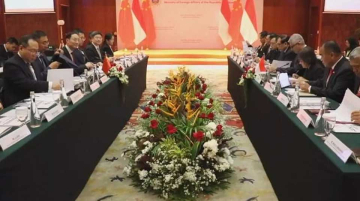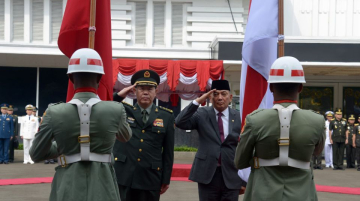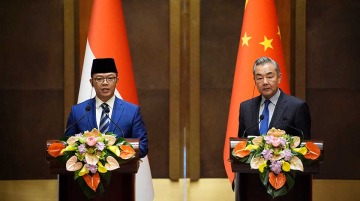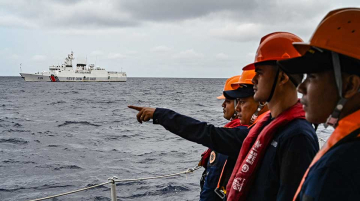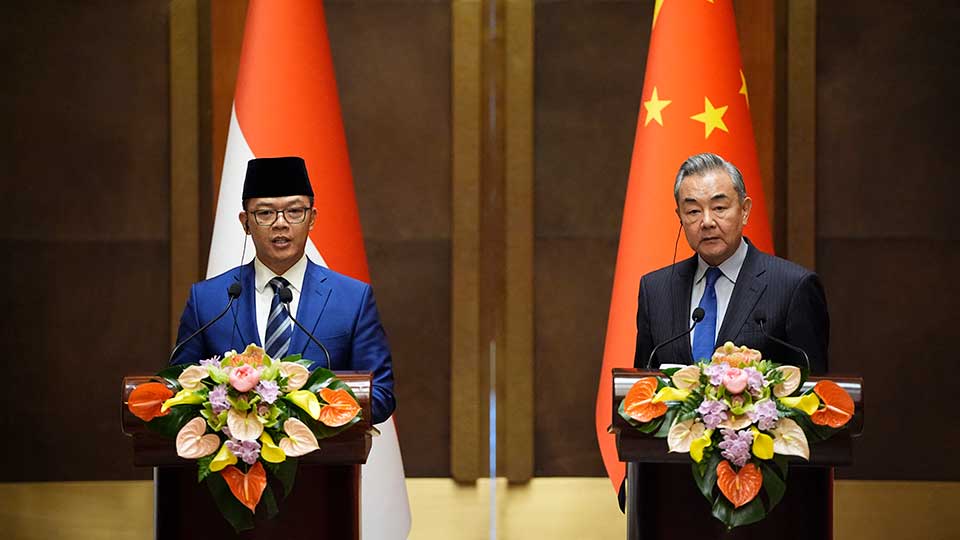
What wasn’t said in Beijing last week may prove far more consequential than what was. At their first-ever 2+2 ministerial-level dialogue, China and Indonesia marked 75 years of diplomatic ties with warm words and ceremonial handshakes at the prestigious Diaoyutai Guesthouse and missed discussing Aukus.
Yet, beneath the smiles, neither side mentioned AUKUS, the trilateral security pact among Australia, the United Kingdom, and the United States that is reshaping Indo-Pacific power dynamics and has direct implications for the region and both countries.
The omission was no accident. It reflects the careful hedging and persistent unease that middle powers like Indonesia must navigate amid rising great power competition.
However, by sidestepping the AUKUS question entirely, Jakarta and Beijing missed a valuable opportunity to align their positions on an issue that could significantly impact regional balance, maritime security, and their broader strategic posture.
Strategically, the meeting built on last year’s lower-level Senior Officials Meeting in Jakarta, signaling an upward trajectory in Indonesia-China ties.
However, the dialogue did not discuss external pressures, such as the growing trend of minilateralism in the Indo-Pacific and the unpredictable strategic ripple effects of AUKUS.
Formed in 2021, AUKUS is a trilateral security arrangement that, amongst others, aimed at bolstering Australia’s defense capabilities, most visibly through the development of nuclear-powered submarines.
AUKUS and Its Implications
Yet, its implications run deeper. The pact also enhances broader defense technologies and strengthens intelligence-sharing among its members, all part of the postwar ‘Five Eyes’ alliance.
Indonesia has expressed concerns from the outset. Former Foreign Minister Retno Marsudi once warned that AUKUS could trigger an arms race and urged Australia to ensure transparency to avoid nuclear proliferation risks.
Indonesia’s anxiety is understandable. It sits at the strategic crossroads of key sea lanes that could be drawn into any future conflict, even as it remains committed to regional peace through initiatives like the Zone of Peace, Freedom and Neutrality (ZOPFAN) and the Southeast Asia Nuclear-Weapon-Free Zone (SEANWFZ).
Five Faces of Risk
The formation of AUKUS has underscored the deepening defense ties between Australia and the U.S., raising alarm in some quarters about a looming threat.
- Its nuclear submarine program challenges ASEAN’s nuclear-free commitments and introduces new uncertainties, especially as these submarines will likely pass through Indonesia’s Sea Lanes of Communication (SLOC).
- AUKUS could pressure Indonesia to upgrade its military technology, funding, and capabilities in response to the evolving security environment.
- The development of AUKUS has generated diverging levels of security dilemmas among countries in the region, which could force Indonesia and China to deepen their dialogue, particularly on maritime security-related issues.
- China and Australia may increasingly view Indonesia as an intermediary for their competing interests, particularly as Australian submarine operations may involve or pass Indonesian territorial waters.
- AUKUS’s emergence is testing ASEAN’s neutrality, as differing perspectives among its members compel China and Australia to intensify their engagement with both ASEAN as a bloc and its members individually.
Common Ground, But Lost Opportunity
To be fair, Indonesia’s position has evolved. Defense Minister Prabowo Subianto in 2023 acknowledged Australia’s right to pursue AUKUS while hinting at Indonesia’s intent to find ways to benefit from the arrangement and promote regional peace.
Still, Indonesia needs a long-term strategy that allows it to adapt to evolving AUKUS policies while safeguarding its security interests.
Our research suggests that Indonesia’s navy, in particular, should develop a comprehensive maritime policy to anticipate the risks of potential armed confrontations as AUKUS evolves.
Last February, three PLA Navy ships steamed through Southeast Asia into Australia, part of an unprecedented circumnavigation of Australia led by the Type 055 destroyer Zunyi, sailing near a strategically sensitive defence facility off Western Australia.
The growing tension between AUKUS and China threatens regional stability, and Indonesia, with its central geographic position, cannot afford complacency.
Ironically, Indonesia and China share several interests regarding the AUKUS question.
- First, both envision an Indo-Pacific free from nuclear weapons and major power conflict.
- Second, both aim to preserve a balance of power that prevents domination by any single bloc.
- Third, both value their growing bilateral ties and are vested in maintaining regional peace.
- Fourth, both have a mutual objective in establishing a peaceful region and would not welcome external actors upsetting that equilibrium.
Shared Interests: Indonesia and China on Aukus
Given their shared concerns, the 2+2 meeting in Beijing should have been the ideal opportunity for China and Indonesia to address AUKUS candidly and coordinate responses.
By avoiding this conversation, both nations missed a chance to align their positions and potentially mitigate the security risks posed by AUKUS.
The implications are significant: AUKUS could escalate tensions, trigger an arms race, and challenge ASEAN’s already fragile neutrality, especially as member states adopt divergent views.
Indonesia risks being caught in the crossfire, with China and Australia seeking to draw Jakarta into their respective side.
AUKUS may also jeopardize the security of Indonesian waterways in the archipelago and the South China Sea. Australia’s enhanced military capabilities, particularly its weapon systems, could force Indonesia and China to strengthen their bilateral military cooperation.
Anak Agung Banyu Perwita is a professor of international relations at the Republic of Indonesia Defense University. Peni Hanggarini, a senior international relations lecturer at Paramadina University in Jakarta, Indonesia, co-authored this article.


